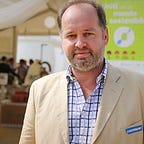Why We Can’t End Hunger Alone
As the World Food Programme works to bring nutritious food to the world’s most vulnerable, NGOs play an important part.
In North Eastern Kenya, the World Food Programme and the NGO Islamic Relief are fighting malnutrition together. Our partnership is synergistic: while Islamic Relief supports the Department of Health in treating cases of acute malnutrition, we provide specialized nutritious foods which are given as part of the treatment.
This relationship isn’t unique — in fact it’s very common. WFP works hand-in-hand with NGO partners, from food distribution in emergencies to longer-term initiatives such as school meals and creating community assets. Three-quarters of our food and cash-based transfer operations are delivered together with NGOs.
These partnerships can take many forms, depending on the context, depending on the NGO. They can go from World Vision International or Save the Children, both of whom we work with in nearly 30 countries — to small local NGOs which help register student attendance in our school meals programmes. But the one thing they have in common is the synchronicity, the bringing to the table of a complementary set of skills and capabilities, which together create something greater than the sum of its parts.
As humanitarian crises are becoming ever more drawn out and complex, it’s increasingly clear that no single organization can address today’s complex food and nutrition challenges alone. Partnership is more important than ever.
Tapping into local knowledge
Local NGOs often have a long-term presence and deep understanding of the communities we support. Their daily contact with communities before, during and after emergencies provides us with an invaluable link to the people we serve.
In Lao, we trained representatives from the Lao Women’s Union in nutrition, hygiene and cooking techniques. They then passed on this training to women in several villages. The strength of the Lao Women’s Union is in its deep-field presence. Their intimate knowledge of local languages and cultural practices helped our messages gain momentum throughout the region, reaching deep into the field to people and places we cannot access alone.
Amplifying our impact
Of course, the World Food Programme can deliver its own programmes — and we do in some settings where finding the right NGO partner may not be possible — but we prefer not to. Together, WFP and NGOs amplify each other’s impact. Pooling our joint resources in a collaborative way allows us to have greater impact for the people we serve.
For instance, WFP has a rich bank of food security data in some of the most remote places in the world, which we collect continually through our mVAM approach and other regular assessments. When we combine our data with that of NGOs, the result is a rich set of information which gives us a comprehensive understanding of the situation in communities and the reasons for food insecurity.
Building capacity
Capacity strengthening has been a buzzword for many years in the humanitarian/development community. Today more than ever, WFP believes in real investments in local capacity — either directly, or through our international NGO partners. By helping civil society build skills and experience, we are ensuring that our interventions have a long-lasting impact — empowering communities and countries to address their own food challenges.
In the Philippines, for example, under our Disaster Preparedness and Response Programme, WFP provides training for NGOs on hazard analysis and early warning to improve disaster preparedness, prevention and response of disaster-prone communities. Since 2011, we’ve conducted at least 15 geographic information system trainings with NGOs in the country, enabling them to develop hazard maps which highlight the areas at risk of natural disasters.
In Syria, WFP has strengthened the institutional capacity of nearly 30 national and local organizations, empowering them to deliver effectively in what is probably WFP’s most complex operation ever. As these NGOs have grown, they have been able to take on new work with new partners, further enhancing sustainability.
Similarly in Somalia, WFP is teaming with some of our larger international NGO partners to support the multitude of small local NGOs that make delivery possible in the country.
These capacity strengthening efforts are now reflected as a commitment under the Grand Bargain, a package of reforms to humanitarian funding signed at the World Humanitarian Summit in Istanbul earlier this year. One of the key commitments of the Grand Bargain is to transfer at least 25 percent of our resources as directly as possible to local and national first responders.
The drive towards a more localized response to humanitarian needs is already reflected in the makeup of WFP’s partner portfolio: 850 of our 1,000 NGO partners are local or national organizations.
The Annual Partnership Consultations
On 26 and 27 October, WFP hosted the Annual Partnership Consultations — a unique opportunity for WFP and our current and potential NGO partners from around the globe to come together. It was a moment for important discussion around issues arising from the World Humanitarian Summit and Grand Bargain processes.
WFP and 60 other organizations discussed adherence to humanitarian principles, the use of cash assistance, innovation in humanitarian response, capacity strengthening, and how partnerships are changing in the Sustainable Development Goal era.
The humanitarian and development world is set to face challenges of unprecedented scale — migration, refugees, a changing climate and population growth. But with big challenges come big opportunities, and we can only seize them when we join our forces together in partnership. As Henry Ford said, “If everyone is moving forward together, then success takes care of itself.”
Watch an interview with Marcus Prior aired on Facebook live.
Find out more about the World Food Programme’s work with NGOs.
